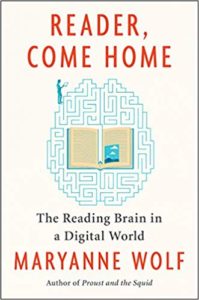Miners used to send canaries into coal mines to see if the air was safe enough to breathe. If the bird lived, it was safe for the workers. If it didn’t, well, that’s where we get the idea of “the canary in the coal mine.” The adage has come to mean an early indicator of danger.
Dr. Maryanne Wolf is the Director of the Center for Dyslexia, Diverse Learners, and Social Justice in the Graduate School of Education and Information Studies at UCLA. Her third book, Reader, Come Home, is about how the digital revolution has changed reading in dangerous ways.
“The reading brain is the canary in our minds,” she writes, adding that good readers are not only a society’s canaries but also its “guardians of common humanity.”
Scrolling on screens leads to skimming, which is the opposite of reading deeply. In studying the skimming phenomenon, Wolf says it happens in a particular pattern, usually an F or a Z, as readers look for key words.
Recently, my husband told me Kindle added a scroll-down function, so he tried it. He found himself skimming, something he never does, not even when reading an e-book. So he went back to the old method of swiping left to turn the page. His said his job in a medical clinic involves a lot of old fashioned paperwork, and he didn’t want to lose the ability to read those documents carefully. For the good of humanity and of society.
Wolf says Aristotle wrote about the three lives of good society, and in her book she applies these characteristics to good readers:
First Life: Gathering Information and Acquiring Knowledge. Wolf writes, “We are awash in this life.” For me, this is reading I do for work and to become an informed citizen.
Second Life: Entertainment. This can be whatever reading you personally find entertaining, whether it’s a mystery, a presidential biography, a history of cancer, or a fantasy series that undermines every fantasy trope ever. (Each link is a book I have read for funsies.)
Third Life: Reflection and Contemplation. Selections from the first two categories may qualify for this third slot when we take the time to read deeply. Wolf says this type of reading is the one most threatened in our digital world and the one we most need to recover in order to return to our reading home.
The one genre that consistently forces me to reflect and contemplate is poetry. It’s why I read a few poems early each day, before I read anything else. It’s just me and my pencil and my notebook and my deep-reading brain. Usually I do this reading outside.
If I’m lucky, I hear a dove. Not a canary.
As this column changes from Reading in the Wild to Reader, Come Home, my task is to model deep reading. That means I’ll only talk about one book each month, seeking the bar Emerson set in his speech titled The American Scholar, delivered to the Cambridge University Phi Beta Kappa Society: “Every sentence is doubly significant.”
I will always be a wild reader and plan to continue sharing my list of good reads and hope you will continue sharing yours as well. Join us, dear readers, and come home.
September’s Pages
Finished
Poetry
The Great Frog Race and other poems, Kristine O’Connell George, illus. Kate Kiesler (picture book poetry)
Adult
A Song of Ice and Fire: A Storm of Swords, George R.R. Martin (at 1,216 pages, spring for the hardback or the audio version)
In the Company of Crows and Ravens, John M. Marzluff and Tony Angell
Middle Grade and YA
Anne Frank: The Diary of a Young Girl, Anne Frank (next Children’s Book Club meets October 12!)
Made Progress
Thrive, Arianna Huffington
Reader Come Home, Dr. Maryanne Wolf
Your turn
1) How does your reading life reflect Wolf’s three characteristics of good readers? Or how can it do so in the future?
2) Did you make some time for deep reading this month? What stories stirred your soul?
3) Share your September pages. Sliced, started, and abandoned are all fair game.
Photo by Andrew E. Larsen, Creative Commons, via Flickr. Post by Megan Willome, author of The Joy of Poetry.
Browse Reading in the Wild
“Megan Willome’s The Joy of Poetry is not a long book, but it took me longer to read than I expected, because I kept stopping to savor poems and passages, to make note of books mentioned, and to compare Willome’s journey into poetry to my own. The book is many things. An unpretentious, funny, and poignant memoir. A defense of poetry, a response to literature that has touched her life, and a manual on how to write poetry. It’s also the story of a daughter who loses her mother to cancer. The author links these things into a narrative much like that of a novel. I loved this book. As soon as I finished, I began reading it again.”
—David Lee Garrison, author of Playing Bach in the D. C. Metro
- Perspective: The Two, The Only: Calvin and Hobbes - December 16, 2022
- Children’s Book Club: A Very Haunted Christmas - December 9, 2022
- By Heart: ‘The night is darkening round me’ by Emily Brontë - December 2, 2022



Glynn says
My first week of September was devoted to reading the proof pages of my novel, both print and ebook versions, for a total of four complete readings. You do what you gotta do.
Mystery
Thin Air by Ann Cleeves (#6 in her Shetland series)
Ten Years Gone by Jonathan Dunsky (1948 Tel Aviv – an Israeli noir novel)
Death in High Provence by George Bellairs (published in 1957 and still a good read)
As Good as Dead by Karen Chester (a cozy mystery set in a bed-and-breakfast)
Fiction
The Fall of Gondolin by J.R.R. Tolkien
Glass Island by Gareth Griffith (a post-Roman, pre-Anglo Saxon historical novel that was quite good)
Be’askaas by Nicholas Kerkhoff (a fantasy novel that doesn’t read like one)
Something Better by Dustin Renz (Christian fiction about overcoming depression)
Penny Pennington by Fabien Roy (an American penny starts talking with an accountant in Montreal – a bizarre premise that turns out to be a very good short novel)
Non-fiction
On Reading Well by Karen Swallow Prior (another fine book from Prior)
A Thousand Small Sparrows by Jeff Leeland (story of the Sparrow Clubs in the Pacific Northwest)
Mississippi Solo by Eddy Harris (canoeing down the river)
Life on the Mississippi by Mark Twain (steamboating down the river)
Poetry
The Bell and the Blackbird by David Whyte
And if you think Facebook doesn’t really mine our personal data, a sponsored ad showed for a t-shirt showed up on my newsfeed yesterday, and the t-shirt read: “Never underestimate an old man who loves reading and was born in September.”
Megan Willome says
Scary, Glynn.
I have the sample of Prior’s book and am looking forward to diving in.
The penny book intrigues me.
L.L. Barkat says
Um, wow. From data to t-shirt, just like that. Someone has gotten quite the business idea. (Weird and wild and, strangely, wonderful…even as it is invasive in its way.)
Sandra Heska King says
This! This is me. I can DO this.
I finally finished copying passages from Provence 1970 and making notes and erasing all my penciled checkmarks so I can return it to the library. Pretty sure I owe a fine.
I’ve about finished Sun Shine Down by Gillian Marchenko (published by T.S. Poetry Press) as an assignment for Laura’s class. I can’t believe it’s been sitting on my shelf for years. Also, I’m reading Karen Swallow’s book (On Reading Well) and finishing up another read of L’Engle’s Walking on Water. I will NEVER finish all the books in my to-read pile. I’ve got a next-up stack after I finish taking notes on these. At least I own the last two, so I can scribble in them.
My daughter-in-law bought me a T-shirt for fun a few weeks ago. It reads, “bookmarks are for quitters.”
Megan Willome says
Sandy, I’m glad this approach is resonating with you. Maybe take one of the books you mentioned — the Provence one or the “Sun Shine Down” — and dig deep. What have you learned? What would you like someone else to learn?
Kortney Garrison says
Excited to read deeply along with you, Megan!
Megan Willome says
Thanks, Kortney!
Anything you’ve read lately that caused you to read more deeply?
L.L. Barkat says
I really like what you shared so far from ‘Reader, Come Home,’ and I hope we’ll hear more about its pages, too, as we move forward with this new column. 🙂
I’m thinking that a reading life does encompass all three of those (the 1st, 2nd, and 3rd life)—but if we are going to reflect and contemplate, it does, naturally, begin to ask this of us: to read a few things worth reflecting on and contemplating.
I’m actually not sure, yet, if I entirely agree with the endangered mind idea altogether, since I have one daughter who had reading difficulties (and still does), yet she’s an amazing writer and thinker with one of the freshest (in a good way 😉 ) voices I’ve yet heard. I suspect that’s because she did hundreds of hours of listening, in lieu. She memorized, too. Just because she wanted to. Whole chapters of books she loved! Which leads me to the theory that if we were to introduce more “By Heart” into children’s and adult’s lives, it might pick up the slack (and even exceed reading’s impact) in this new digital world.
September:
Started:
• listening to The Order of the Phoenix
• Reader, Come Home
• The Organized Mind
• The Lonesome Dove (am thinking to order this on listening CD instead)
Finished:
• Start With Why
Still reading, slow but sure:
• The Golem and the Jinni
Abandoned:
The Virgin Way (it’s not what you’re thinking 😉 )
Megan Willome says
I took “Lonesome Dove” to the beach a few years ago and fell in love. Mostly with Clara. Also with Lorrie’s one desire, to live somplace cool.
I do plan to pull out other ideas from “Reader, Come Home” each month. Next month’s will be empathy.
Bethany R. says
Thank you for pointing us toward deeper reading, Megan. One way I do this is by printing off online posts. I find it easier to digest the words and meaning that way. Often I fold them up and put them in my purse for when I sit in my car and wait for my kiddo’s school to let out. Then I can mull as I walk to the building and back. 🙂
Megan Willome says
What a great idea, Bethany! Particularly the part about time to mull as you walk.
Once I finish a book, I like to wait a day or two before I start a new one. Then I write about it, usually after mulling on a walk.